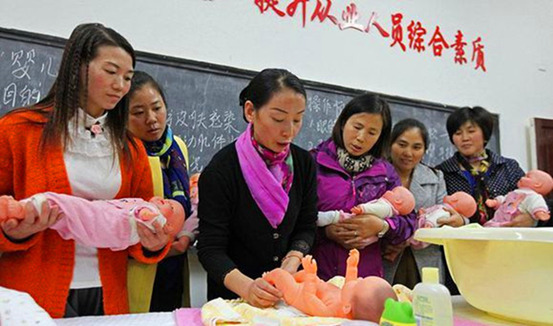
The nursery industry booms as China's two-child policy comes into effect. Pictured is a nursery training course in Ningbo, East China's Zhejiang Province. (Photo/People.cn)
After China's two-child policy came into effect on the first day of 2016, the country is predicted to embrace a "baby boom." Though some worried about the burden brought to society and environment, experts believed that those challenges could be addressed as the country is taking some pre-emptive measures.
More than 90 million women will become eligible to have a second child after China formally moved away from the one-child policy to allow all couples to have two children. Although surveys show that only 28 percent of eligible women are willing to do so, it will contribute to an annual 3-5 million extra population growth in China.
A woman surnamed Zhou is one of those beneficiaries. With a 6-year-old son, she now plans to have a second one.
Zhai Zhenwu, director of the China Population Association, estimated that, annual population growth will peak in the next 4 to 5 years at 20 million. Afterwards, the number of newborns will stabilize at around 17 million each year, which is a reasonable range for China.
Based on these predictions, China's peak populations will reach at 1.45 billion in 2029, two years later than the initial calculation.
According to Zhai, the two-child policy will improve the labor force situation as well as the aging population in China. By 2050, more than 30 million people will be part of the work force compared to today and the percentage of senior citizens will drop by 2 percent.
Meanwhile, it will also drive up the economic growth rate by about half a percentage point. Family functions, such as taking care of the aged and inter-generational support will be further consolidated, said the director.
Many believe that the termination of the decades-long-one-child policy will address China's labor force drop, which has started since 2012.
China has been taking precaution measures since over 10 years ago, said Wang Pei'an, vice-minister of the National Health and Family Planning Commission (NHFPC).
From 2004 to 2006, China conducted strategic research on population growth. One year later, the then authoritative body came up with a tri-step strategy gradually allowing more couples to have a second child, Wang introduced.
Previously, Chinese couples were allowed to have a second child if at least one spouse was an only child. By the end of September 2015, about 1.76 million eligible couples filed application for this privilege.
The fertility rate in 2014 increased by 0.29 in a thousand from 2013, while the boy-to-girl birth ratio dropped by 1.72 percentage point, the most drastic shift in both figures in recent years.
Scholars worry about the baby boom's effect on the environment, women's employment and the family burdens. Healthcare services will also be challenged by a shortage of doctors and beds.
Some others have expressed concern about the employment, education and housing pressure these babies will cause when they grow up.
But experts told the People's Daily that these predicable challenges can be addressed. China is now introducing more supporting policies to encourage more couples to have a second baby.
The NHFPC, for example, is now working with the Ministry of Education to bolster the admission of pediatric undergraduates to universities to meet the increasing demand brought by the "baby boom." The NHFPC also listed it as a priority in its 2016 work agenda.


















































